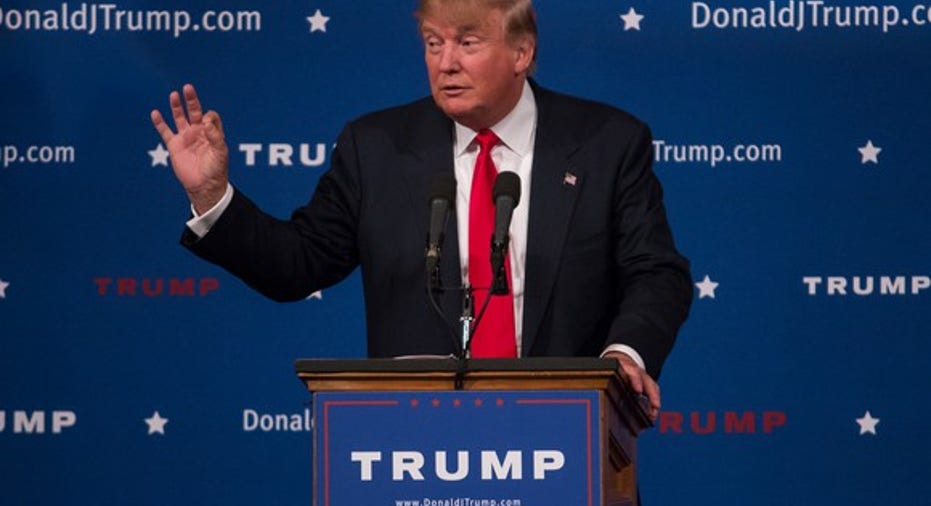Is a Trump Tax Plan Coming in 2017?

Image source: Iowa Public Radio Images via Flickr
One of the cornerstones of President-elect Donald Trump's presidential campaign was his promise to lower taxes for all Americans, rich and poor. He has promised to slash tax rates for individuals and corporations, eliminate the estate tax, increase the standard deduction, and offer increased tax breaks for child care, just to name a few things. Here's what Trump has proposed, and what's likely to happen in 2017 during his first year in office.
Donald Trump's tax plan
While his tax plan evolved over the course of his campaign, Trump's final version of his tax plan called for consolidation of the current seven tax brackets into just three, with rates of 12%, 25%, and 33%. Since Trump plans to repeal the Affordable Care Act, the 3.8% surtax on certain investment income that helps fund the Act would be eliminated.
In addition, Trump wants to more than double the standard deduction to $15,000 for singles and $30,000 for married taxpayers, from the current levels of $6,200 and $12,400, respectively. Because of this increase, the personal exemption would be eliminated, as would the head of household tax filing status. Itemized deductions would be capped at $100,000 for single filers or $200,000 for joint filers.
Trump also wants to offer a larger deduction for child care expenses, planning to implement an above-the-line deduction that will be capped at the state average for care, and would be limited to a maximum of four children per taxpayer (currently two). He also wants to offer additional child care incentives for lower-income taxpayers.
For the wealthy, Trump pledges to get rid of the estate tax, a position widely supported by Republicans and that currently only affects estates valued at $5.45 million or higher.
On the corporate side of things, Trump wants to lower the top corporate tax rate from 35% to 15%, and would allow profits currently being kept abroad to be repatriated at a special 10% one-time rate.
Potential roadblocks
With a Republican Congress, there shouldn't be too much opposition to Trump's proposed tax cuts. The three tax brackets Trump has proposed are the exact same the Republican leaders in Congress have called for, and the GOP has been trying to repeal the estate tax for a long time.
Where Trump might run into some resistance is the amount of deduction his plan allows for, as well as his proposed corporate tax rate. According to a recent analysis by the Committee for a Responsible Federal Budget, Trump's plan as it is written would reduce revenue by $5.8 trillion and add approximately $5.3 trillion to our national debt over a 10-year period, and that probably won't sit well with many fiscally conservative Republicans.
Specifically, many Republicans want lower tax rates, but fewer deductions. For example, the House Republican tax platform calls for the exact same tax rates as Trump's plan, but would eliminate all itemized deductions except the mortgage interest and charitable contribution deductions. And a corporate tax rate of 15% is significantly lower than the 20% rate the House Republicans are calling for.
Most importantly, the House Republicans' platform calls for a balanced budget and paying down the national debt. While running a surplus may be a bit of a stretch, at least in the short term, the House Republicans' tax plan would reduce revenue by $191 billion over the next decade when accounting for the economic growth it would produce, according to the non-partisan Tax Foundation, which would be a small fraction of the long-term cost of Trump's plan.
What's most likely to happen?
As I mentioned, Trump shouldn't have too much trouble getting his new tax brackets implemented, nor should he encounter much resistance if he tries to repeal the estate tax. However, it is likely that Trump will need to compromise on his corporate tax rate, as well as the amount of deductions he plans to retain in order to make his plan more revenue-neutral.
In whatever form it eventually takes, tax reform is a big priority for President-elect Donald Trump and other Republicans alike, so it's safe to assume that some version of the tax proposals discussed here will be implemented under Trump's administration.
The $15,834 Social Security bonus most retirees completely overlook If you're like most Americans, you're a few years (or more) behind on your retirement savings. But a handful of little-known "Social Security secrets" could help ensure a boost in your retirement income. For example: one easy trick could pay you as much as $15,834 more... each year! Once you learn how to maximize your Social Security benefits, we think you could retire confidently with the peace of mind we're all after.Simply click here to discover how to learn more about these strategies..
Try any of our Foolish newsletter services free for 30 days. We Fools may not all hold the same opinions, but we all believe that considering a diverse range of insights makes us better investors. The Motley Fool has a disclosure policy.



















